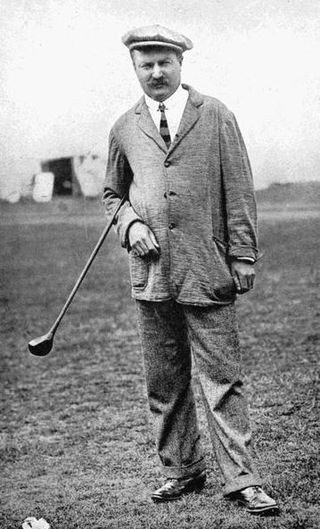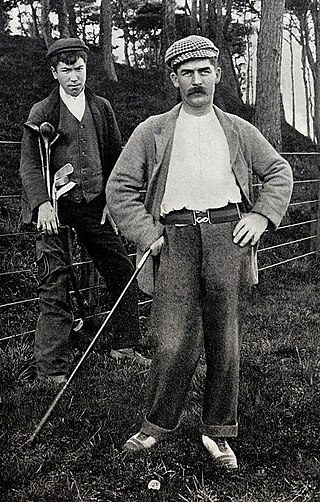
John Henry "J.H." Taylor was an English professional golfer and one of the pioneers of the modern game of golf. Taylor is considered to be one of the best golfers of all time. He was a significant golf course architect. Taylor helped to found the British PGA, the world's first, and became respected for his administrative work. He also wrote two notable golf books.

James Martin Barnes was an English golfer and a leading figure in the early years of professional golf in the United States. He is one of three native Britons to win three different modern major professional championships.

Henry William Vardon was a professional golfer from Jersey. He was a member of the Great Triumvirate with John Henry Taylor and James Braid. Vardon won The Open Championship six times, and also won the 1900 U.S. Open.

Arnaud George Watson Massy was one of France's most successful professional golfers, most notable for winning the 1907 Open Championship.

Frederick Robertson McLeod was a Scottish-American professional golfer who had a distinguished career in the United States, which included victory in the 1908 U.S. Open. He was born in Kirk Ports, North Berwick, East Lothian, Scotland.

Edward Rivers John Ray was a British professional golfer, one of the leading players of the first quarter of the 20th century. He won two major championships, the Open Championship in 1912 and the U.S. Open in 1920, and contended in many others. He was captain of the British team in the inaugural Ryder Cup, in 1927.

Bernard "Ben" Sayers was a Scottish professional golfer, who later became a distinguished golf teacher, golf course designer and manufacturer of golf clubs and equipment. Sayers had a reputation for making good quality gutta-percha golf balls.

George Duncan was a Scottish professional golfer. He was also a golf course designer. His much sought-after professional teaching and swing analysis skills lead to him being referred to as "the pro's pro." He won the 1920 Open Championship.

John White was a Scottish professional golfer. He posted six top-10 finishes in the Open Championship, including a victory in 1904.

The Toronto Golf Club is a private golf club in Mississauga, Ontario, a suburban municipality to the west of Toronto. Established in Toronto in 1876, it is the third-oldest golf club in North America, after the Royal Montreal Golf Club and the Royal Quebec Golf Club. The Toronto Golf Club adopted its current name in 1909 and moved to its present location in 1913. The club has hosted the Canadian Open five times and the Canadian Amateur Championship nine times, more than any other club.

John Owen "Jack" Hobens was a Scottish-American professional golfer. He was born in Dunbar, Scotland, to Thomas Hoben and Elizabeth (Annie) Owen. He learned the game of golf by starting out as a caddie. Jack had five brothers and a sister.

Henry Gullane was a Scottish professional golfer. Gullane finished in eighth place in the 1899 U.S. Open, held 14–15 September 1899, at Baltimore Country Club in Baltimore, Maryland.

Charles Henry Mayo was an English professional golfer of the early 20th century. Mayo won the 1911 Belgian Open held at the Royal Golf Club of Belgium. Frenchman Arnaud Massy finished in second place. He had seven starts in the Open Championship, his best finish being T11 in 1912. He finished runner-up in the 1908 French Open and had five international appearances representing England against Scotland.

George Lyall Fotheringham was a Scottish-American professional golfer who played in the early 20th century. He won the South African Open five times and was a founding member of the PGA of America.
William Martin Watt was a Scottish professional golfer. He won the Scottish Professional Championship in 1912 and tied for 8th place in the 1923 Open Championship.

Robert Thomson was a Scottish professional golfer who played in the late 19th century into the early 20th century. Thomson had two career top-10 finishes in the Open Championship. In 1903 he finished tied for 6th place and in 1905 finished 7th.

James Melville Dron Hepburn was a professional golfer from Scotland who played in the late 19th century into the early 20th century. He once served as the secretary of the British PGA and later became one of the founding members of the PGA of America. As a player, he posted two top-10 finishes in the Open Championship, a T8 result in 1909 and a T10 finish in 1911.
James Benjamin Batley (1876–1964) was an English professional golfer. His main successes came in foursomes events, winning the 1909 London Professional Foursomes Tournament and the 1914 Sphere and Tatler Foursomes Tournament. He played for England in the 1912 England–Scotland Professional Match.

Mungo Park Jr. was a pioneer in South American golf and golf clubmaking. Park was also a successful golfer and golf course architect. He won the Argentine Open three times, including the inaugural championship in 1905. He was part of the famous Park family from Musselburgh that won a total seven Open Championships in the 19th century.

George Wylie Alexander Livingstone was a Scottish golf professional who emigrated to the U.S. in 1912. He is best known for breaking Bobby Jones' world record for 36 consecutive holes of tournament play in 1926 at the Southeastern PGA Tournament with a 67–66. Livingstone left his home in North Berwick, Scotland, at age 31 (1912) to come to the United States, hoping to capitalize on golf's explosive popularity there. He was undoubtedly influenced by the success of several of his boyhood golfing companions from North Berwick, including Willie Anderson and Fred McLeod, who had each won the U.S. Open.














